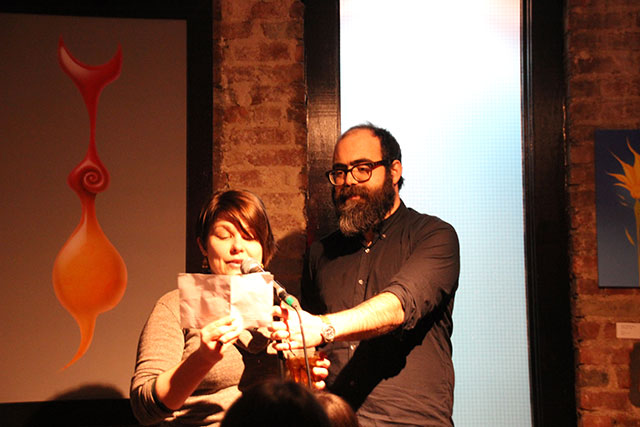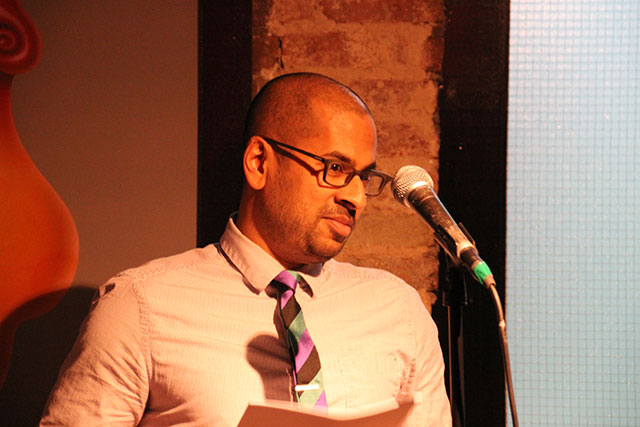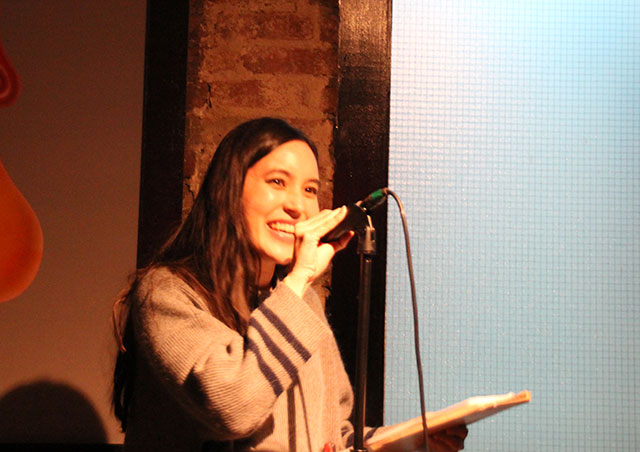
The Disagreement, an edited reading series, recently hosted “I kept telling myself you’re ok; you’re not that bad” at The Hi-Fi Bar in the East Village. The Disagreement’s founders, editors and hosts, Bryant Musgrove and Melissa Swantkowski, seek work for their series that “demands to be read aloud.” They aim to present “the funny in the sad, grotesque, and the perverse.” On Janurary 13th, they certainly met that criteria.
Packed into a private room, regaled with its own bar and bartender, the audience enjoyed four stories that did indeed demand attention and spark laughs, stories all inspired by the theme of denial and the event’s title. Musgrove and Swantkowski opened the night by briefly introducing the series—eager to get right to the stories they were proud to share with the crowd.
When asked how such titles and themes are created, Musgrove responded, “For the first year, everything had ‘Vs.’ themes, like ‘Satan Vs. Your Dentist.’ For the second year, we largely picked themes with one word, thus ‘Shithoused.’ [By] the third year, we were stumped on what to do…we entered into Google all the themes from the first two years and picked out sentences and questions from the search results that we thought were funny, ending up with things like ‘I kept telling myself you’re ok; you’re not that bad,’ when we searched for ‘Drugs Vs. Your Mom.’”
Audiences felt more than okay as Allie Werner read “Antarctica,” first published in Hobart. Werner’s voice resounded, “Antarctica wants you dead,” as she read her second-person narrative about a character on an artist fellowship drawing diatoms. When the documentarian of the story says, “Look at these brainless animals,” you say, “Get away from my diatoms.” And “you punch him in the jaw.”

The second reader, Rumaan Alam, shared “Turn Down”—a work that appeared in PANK about a man who travels for work and comments on “hotelness” and his own desires among the monotony of daily routines. Alam’s narrator proclaims, “No body wants to be friends with anyone after all; they want to go home and do the same thing they always do.”
Audiences who actually do leave their homes to attend this series will not be disappointed. The strangeness of the themes and titles, sired from that dimly lit, sticky-floored muse called a bar, create a lively setting. Musgrove commented, “Our reading series, like many things associated with it, was born during a conversation we had at a bar. We’d just been to a rather dreary, boring reading somewhere and in the course of rather lamely shit-talking the thing, decided to see if we couldn’t put our money where our mouth was and do it better.”
We have all been to such events. Writers read over the allotted time; audiences check phones and train schedules as the minutes slowly labor on. The idea of an edited series undeniably fixes many of those problems before the event even begins, as the editors might ask for changes to keep in the fifteen-minute time frame. More importantly, the work they curate is engaging, keeping the focus on quality work over brevity.
After a quick intermission for guests to refill their glasses, Marianne Mckey, nominated for a Pushcart Prize in 2010, performed “Gone.” Written in lyrical prose, the narrator daydreams in her bed, on the train, and at work (“Work is stress until I get there, then it’s just annoying”), trying to replace the frigid temperatures with her own erotica. Sitting at a bar, she scopes out her scene: “There are four candidates. All regulars like me. Two of them striking. Two of them attractive from repetition.” Look for the full story in an upcoming issue of She/Folk.

Alexandra Kleeman, whose debut novel You Too Can Have a Body Like Mine will be out summer 2015, closed the night. Before she read, she retorted that the story “used to be 40% cows,” but she took them out. Her story was about Karen, a writer struggling through a break up, working on a diary farmer article. Karen’s depression causes her to watch up to two movies a day: “There are almost enough movies to live your entire life in them.”
Although potential readers can submit poetry, fiction and nonfiction, sometimes The Disagreement solicits work. This January’s reading featured only one submission, Mckey’s “Gone,” while the other three pieces were solicited after Musgrove and Swantkowski read them online. The piece Kleeman was solicited for was not the story they all decided on for the night; Swantkowski revealed, “We came across Kleeman’s work in Guernica –we loved her story ‘You, Disappearing’ and solicited her to read, and then she suggested another piece, and we all agreed that it was an even better fit for the theme and with the other pieces we had planned for the night.”
The passion for the event and the individual works themselves is also visible in the way The Disagreement helps publicize their readers’ work. Swantkowski stated, “If any of our reader’s work is previously published, we will link to it. It doesn’t matter to us if the piece has ‘found a home’ yet, but if it has we want to re-publicize it and hope that a fresh set of readers can enjoy it, both at the reading and if they happen to come across our website and click through.”
Throughout the night, the stories never came across as forced into the theme or stripped for time, which could be an issue for such a specific series. Instead, the characters’ tones each exemplified the title of the night in nuanced ways, and the four readers all had a strong stage presence. “Gone” had people laughing throughout; the other narratives inspired chuckles at various lines and actions. These elements produced a captivating and fresh event, one far from gimmick or constraint. The creators did put their money where their mouth was after all.
The next reading, their anniversary event, will be in March and is titled “What business do you have to cry here?” Submissions are due February 12th. Submit your work to become part of the Disagreement family or show up for booze and laughs. For more information, check out thedisagreement.com and follow them on Twitter @disagreelit.